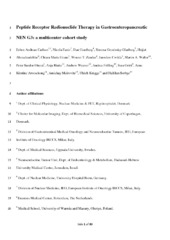| dc.contributor.author | Carlsen, Esben Andreas | en_US |
| dc.contributor.author | Fazio, Nicola | en_US |
| dc.contributor.author | Granberg, Dan | en_US |
| dc.contributor.author | Grozinsky-Glasberg, Simona | en_US |
| dc.contributor.author | Ahmadzadehfar, Hojjat | en_US |
| dc.contributor.author | Grana, Chiara Maria | en_US |
| dc.contributor.author | Zandee, Wouter T. | en_US |
| dc.contributor.author | Cwikla, Jaroslaw | en_US |
| dc.contributor.author | Walter, Martin A. | en_US |
| dc.contributor.author | Oturai, Peter Sandor | en_US |
| dc.contributor.author | Rinke, Anja | en_US |
| dc.contributor.author | Weaver, Andrew | en_US |
| dc.contributor.author | Frilling, Andrea | en_US |
| dc.contributor.author | Gritti, Sara | en_US |
| dc.contributor.author | Arveschoug, Anne Kirstine | en_US |
| dc.contributor.author | Meirovitz, Amichay | en_US |
| dc.contributor.author | Knigge, Ulrich | en_US |
| dc.contributor.author | Sorbye, Halfdan | en_US |
| dc.date.accessioned | 2020-05-13T11:30:37Z | |
| dc.date.available | 2020-05-13T11:30:37Z | |
| dc.date.issued | 2019 | |
| dc.Published | Carlsen EA, Fazio N, Granberg D, Grozinsky-Glasberg, Ahmadzadehfar, Grana, Zandee, Cwikla, Walter MA, Oturai, Rinke A, Weaver, Frilling, Gritti, Arveschoug, Meirovitz, Knigge U, Sorbye H. Peptide receptor radionuclide therapy in gastroenteropancreatic NEN G3: A multicenter cohort study. Endocrine-Related Cancer. 2019;26(2):227-239 | eng |
| dc.identifier.issn | 1479-6821 | |
| dc.identifier.issn | 1351-0088 | |
| dc.identifier.uri | https://hdl.handle.net/1956/22227 | |
| dc.description.abstract | Peptide receptor radionuclide therapy (PRRT) is an established treatment of metastatic neuroendocrine tumors grade 1–2 (G1–G2). However, its possible benefit in high-grade gastroenteropancreatic (GEP) neuroendocrine neoplasms (NEN G3) is largely unknown. We therefore aimed to assess the benefits and side effects of PRRT in patients with GEP NEN G3. We performed a retrospective cohort study at 12 centers to assess the efficacy and toxicity of PRRT in patients with GEP NEN G3. Outcomes were response rate, disease control rate, progression-free survival (PFS), overall survival (OS) and toxicity. We included 149 patients (primary tumor: pancreatic n = 89, gastrointestinal n = 34, unknown n = 26). PRRT was first-line (n = 30), second-line (n = 62) or later-line treatment (n = 57). Of 114 patients evaluated, 1% had complete response, 41% partial response, 38% stable disease and 20% progressive disease. Of 104 patients with documented progressive disease before PRRT, disease control rate was 69%. The total cohort had median PFS of 14 months and OS of 29 months. Ki-67 21–54% (n = 125) vs Ki-67 ≥55% (n = 23): PFS 16 vs 6 months (P < 0.001) and OS 31 vs 9 months (P < 0.001). Well (n = 60) vs poorly differentiated NEN (n = 62): PFS 19 vs 8 months (P < 0.001) and OS 44 vs 19 months (P < 0.001). Grade 3–4 hematological or renal toxicity occurred in 17% of patients. This large multicenter cohort of patients with GEP NEN G3 treated with PRRT demonstrates promising response rates, disease control rates, PFS and OS as well as toxicity in patients with mainly progressive disease. Based on these results, PRRT may be considered for patients with GEP NEN G3. | en_US |
| dc.language.iso | eng | eng |
| dc.publisher | Bioscientifica | eng |
| dc.title | Peptide receptor radionuclide therapy in gastroenteropancreatic NEN G3: A multicenter cohort study | en_US |
| dc.type | Peer reviewed | |
| dc.type | Journal article | |
| dc.date.updated | 2020-01-10T11:30:39Z | |
| dc.description.version | acceptedVersion | en_US |
| dc.rights.holder | Copyright 2019 Society for Endocrinology | |
| dc.identifier.doi | https://doi.org/10.1530/erc-18-0424 | |
| dc.identifier.cristin | 1693201 | |
| dc.source.journal | Endocrine-Related Cancer | |
